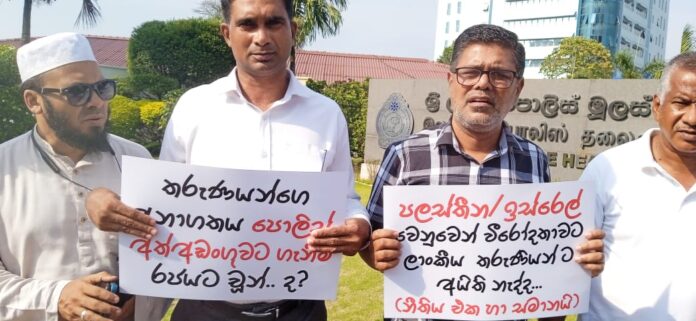A youth who was arrested and detained under the Prevention of Terrorism Act (PTA) for pasting a sticker insulting Israel has been released after he was produced before the Attanagalla Magistrate’s Court today (07).
A 22-year-old youth named Mohammed Rushdie, a resident of Nittambuwa, was arrested on March 22.
Police tried to justify his arrest and detention as usual but now one more police lie has fallen apart.
For example, earlier, the police issued a statement regarding the arrest, stating that they had initiated an investigation based on information received regarding the pasting of this sticker.
The police stated that the arrest was made on the basis of reasonable suspicion that the young man who committed this act was a person who was susceptible to committing a terrorist act in some way, based on the information revealed during the investigation, which went beyond the mere act of pasting a sticker, and other important information revealed during the investigation.
Since it has been observed that he is a person who has been subjected to some mental motivation due to using the internet and other methods, the police said in a statement that further investigations will be conducted regarding his susceptibility to committing a religious extremist act based on that mental state.
Local and international organisations campaigned against using Prevention of Terrorism Act to detain Mohammed Rushdie for opposing Israel genocide in Gaza.
Issuing a statement London-based Sri Lanka Campaign said that:
Arrested for a Gaza Sticker: Mohamad Rusdi’s PTA Detention
Protesters in Colombo are demanding the release of Mohamed Rusdi (also reported as Mohamed Rushdie), the 20-year-old detained under the PTA for a Gaza solidarity sticker.
On March 22, 2025, Rusdi – a young Muslim salesman from Colombo – was arrested after CCTV footage caught him pasting a small sticker in a mall that read “F… Israel,” a brief slogan condemning Israeli military actions in Gaza. Instead of being charged with a minor offense such as vandalism, he was detained under the Prevention of Terrorism Act (PTA) – a sweeping anti-terror law – and held on a 90-day detention order by the Terrorism Investigation Division.
Rights activists and community members erupted in protest at what they view as a blatant abuse of the PTA. In late March, demonstrators gathered outside the police station in Slave Island, waving placards and distributing thousands of pro-Palestine stickers to highlight the suppression of free expression. They insist that Rusdi’s sticker was a peaceful expression of solidarity with the Palestinian people, not an act of terrorism, and warn that treating it as such criminalizes dissent. “Where does free speech end and terrorism begin?” asked one editorial, lambasting the overreaction of invoking anti-terror laws over a sticker. A Colombo opposition MP, Mujibur Rahman, questioned whether Sri Lanka’s longstanding policy of supporting Palestine still stands in light of this arrest.
The government, however, has doubled down. Officials defended the arrest on national security grounds, with a police spokesperson alleging that Rusdi was “harbouring extremist views” – implying the sticker was just one symptom of a larger threat. Media reports indicate the sticker contained a crude phrase against Israel and that an anonymous tipster alerted police, who then reviewed surveillance footage and apprehended the young man. Rusdi now faces the prospect of weeks or months behind bars without charge, thanks to the PTA’s provisions for prolonged detention.
International human rights groups have been quick to condemn Rusdi’s detention. Amnesty International and others note that the PTA has a notorious legacy in Sri Lanka – enabling arbitrary arrests, torture, and the silencing of minorities under the guise of security. Using this draconian law against a peaceful protest sticker not only violates free speech, they argue, but also flies in the face of President Dissanayake’s own campaign promise to repeal the PTA. Amnesty has urged the government to drop the baseless terror investigation into Rusdi and release him, stating that expressing solidarity with Gaza should not be conflated with terrorism. The incident has become a rallying cry for activists, who fear that even under a new government, Sri Lanka’s culture of repressing dissent remains intact.
